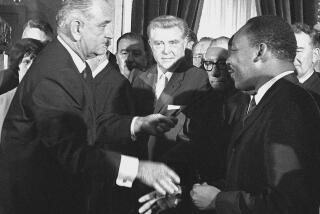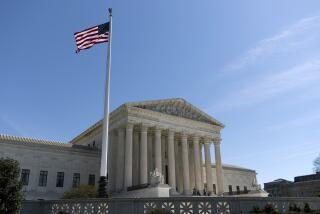Infamous Attack
- Share via
Atty. Gen. Edwin Meese III has demonstrated once again that he either does not know or does not care what rights the Constitution guarantees or how the courts guard them. This time he has denounced as “infamous” two landmark rulings from the 1960s that protect all Americans from unlawful searches and ensure that they are advised of their rights if arrested.
This is not the first time that Meese has spouted off on these subjects. The Reagan Administration in general and Meese in particular have established a consistent pattern of hostility to the Bill of Rights--a pattern that seems to say that government is above the Constitution.
What has Meese’s dander up now are the U.S. Supreme Court decisions in Mapp vs. Ohio, which established the rule that improperly seized evidence cannot be used at a trial, and in Miranda vs. Arizona, which established the rule that a criminal suspect cannot be questioned by the police until he is told that he can remain silent and have a lawyer.
Neither of these rules is written into the Constitution, but the rights that they protect are explicitly guaranteed there. The courts have established the exclusionary rule and the Miranda rule as remedies to prevent the abuse of rights. If there is no remedy for the violation of a right, what good is having it? Without remedy, government can violate a right with impunity.
The Fourth Amendment says that people cannot be subjected to “unreasonable searches and seizures.” The exclusionary rule adds that if an unreasonable search or seizure has taken place, the evidence obtained from it cannot be introduced in court. The police and prosecutor may not benefit from the fruit of an unlawful search.
Similarly, the Sixth Amendment says that persons accused of a crime are entitled to have “the assistance of counsel.” If the government ignores that right, what remedy does an accused person have? Under the Miranda rule, if a person has not been informed of his rights, nothing that he says may be used against him. Once again the courts have removed the incentive for the police to behave improperly.
This is not merely an academic argument about remedies. Meese’s attack on the remedies is a way of attacking the underlying rights. In a nation of law, that attack fits the definition of infamous far better than do the decisions that Meese finds so abhorrent. The remedies are the means that the courts use to enforce the rights. Meese wants to weaken the rights by abolishing the remedies.
But he has done this before. Meese was the architect of the Administration’s plan (since dropped) to impose lifetime censorship on federal employees. He would weaken the separation of church and state. He opposes the Voting Rights Act, a key weapon against racial segregation. He seeks to overturn the Supreme Court’s decision declaring anti-abortion laws unconstitutional. He believes that the Supreme Court has been wrong for 60 years in holding that the Bill of Rights applies to the states as well as to the federal government.
The Bill of Rights limits government power. Unfortunately, the attorney general seeks more power for government and less for individuals. His position is anathema to a free society.
More to Read
Sign up for Essential California
The most important California stories and recommendations in your inbox every morning.
You may occasionally receive promotional content from the Los Angeles Times.













